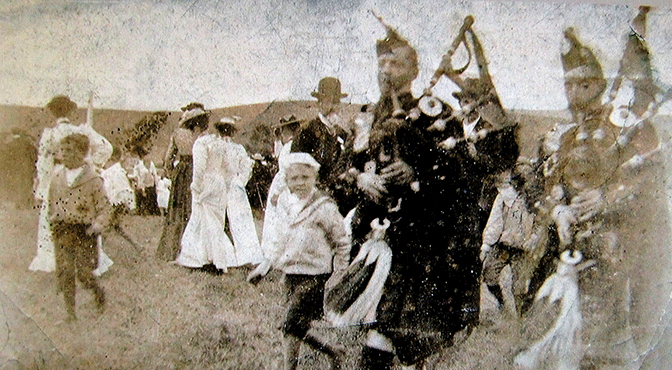
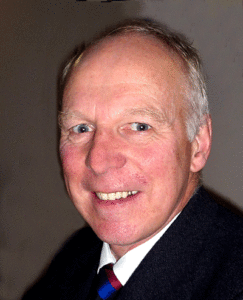
We are very grateful to Mr Bill Wotherspoon, Gold Medallist, solo piping adjudicator and Secretary of the Piobaireachd Society, for forwarding photographs and information relating to piper Duncan Campbell of Foss, Perthshire.
Mr Wotherspoon was recently on a trip to the South Island of New Zealand and spotted the pictures and text in the Otago Settlers Museum, Dunedin.
Duncan Campbell is known to all piobaireachd students and piping historians as the compiler of the manuscript attributed to him and from which tunes such as the popular Nameless-Hiharin Dro o Dro are taken. The museum’s display text is headed ‘Bagpipes made in Scotland around 1850s’. The rest of the text reads: ‘Bagpipe music is an instantly recognised part of Scottish culture, in peace and war.
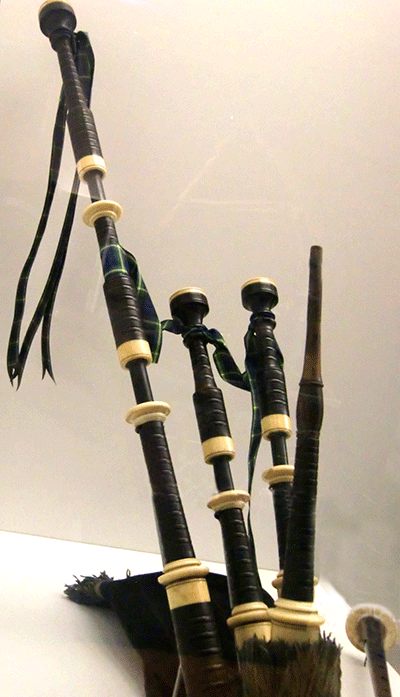
‘These pipes were originally awarded to Duncan Campbell in Scotland as first prize for piping at Perth Highland Gathering. Campbell sold them to his pupil Alexander Wood who took them around the world. They were stolen in Australia but later recovered in America minus the chanter. Wood packed his pipes for the journey to Otago [NZ] and arrived in 1858.’
Accompanying this text is the main picture (top) which may be of Alexander Wood playing the pipes, though this is mere speculation. The caption for this photograph reads: ‘A gathering of pipers in Dunedin 1890s’.
[wds id=”6″]
Mr Wotherspoon has written: ‘Here’s a little potted history of Duncan Campbell written by Archibald Campbell in the introduction of the Duncan Campbell MS. There’s a little more info and a picture on the Glenbuchat heritage website gathered by Alistair Campsie.’
Archibald Campbell’s text: ‘Duncan Campbell (1814-1860) was a native of Foss on Loch Tummel and one of the many pupils of John MacKay (Raasay and afterwards Drummond Castle), father of Angus.
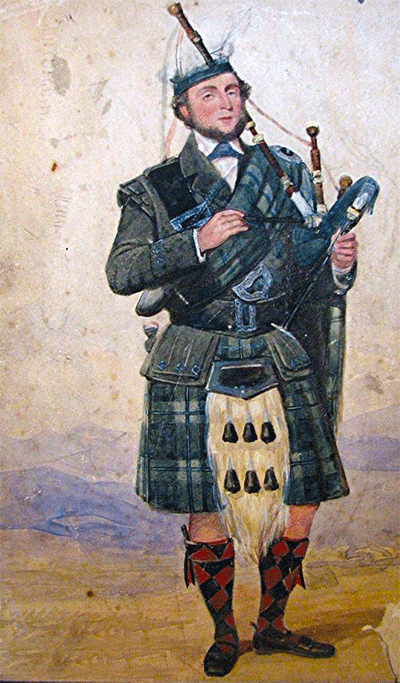
‘Duncan Campbell competed four times at the Highland Society’s competitions in Edinburgh. In 1835, 1838, and 1841; he entered as ‘from Foss’, in 1844 as piper to Glenlyon. He got third prize in 1838, and being thereafter eligible only for a higher prize, was defeated by one vote in 1844 for second place to Donald Cameron. Lord Glenlyon succeeded his father as second Lord Glenlyon in 1837, and his uncle as 6th Duke of Atholl in 1846.
‘Duncan Campbell is frequently spoken of as having been piper to the Duke of Atholl, so it was presumably after 1846 that he was piper to Sir Charles Forbes of Newe in Strathdon. Later he was Pipe-Major of the Edinburgh Volunteers and it was in Edinburgh he met his death in 1860 by falling from a scaffold. He left at least two manuscripts of piobaireachd. Archibald Campbell of Kilberry.’
A letter to ‘The Scotsman’ regarding the Duncan Campbell MS: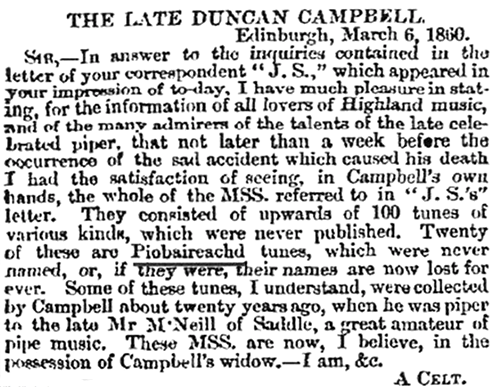 Alistair Campsie: ‘Duncan Campbell was born at Balintyre, Glen Lyon, in the parish of Fortingall in Perthshire, on 1 June 1816…..Duncan Campbell, 1816-1860 had earlier been piper to the Duke of Atholl at Blair Castle in Perthshire, and had moved on because of castle gossip. He had copied out the manuscript for his new employer to whom it was supposedly inscribed: ‘Sir Charles Forbes of Newe, 21 February 1853, Highland Bagpipe Music.’
Alistair Campsie: ‘Duncan Campbell was born at Balintyre, Glen Lyon, in the parish of Fortingall in Perthshire, on 1 June 1816…..Duncan Campbell, 1816-1860 had earlier been piper to the Duke of Atholl at Blair Castle in Perthshire, and had moved on because of castle gossip. He had copied out the manuscript for his new employer to whom it was supposedly inscribed: ‘Sir Charles Forbes of Newe, 21 February 1853, Highland Bagpipe Music.’
‘Sir Charles may well have paid him to copy out Angus’s manuscript and was evidence of the family’s dedication in helping to save Highland culture, which was then all the rage among the landed classes, for Duncan Campbell left the manuscript behind when he departed from Newe. It was certainly through other hands afterwards, and other copies were apparently made.
‘Duncan went south to become pipe major of the Edinburgh City Volunteers, but sadly he afterwards fell off a scaffold on which he was working in the city in 1860 and was killed. His funeral was a magnificent one, from his house to Newington Cemetery, the pipers of the 78th Highlanders playing laments all the way through an immense crowd of spectators.’
• Read an important follow up to this article here.
[wds id=”10″]















Recent Comments